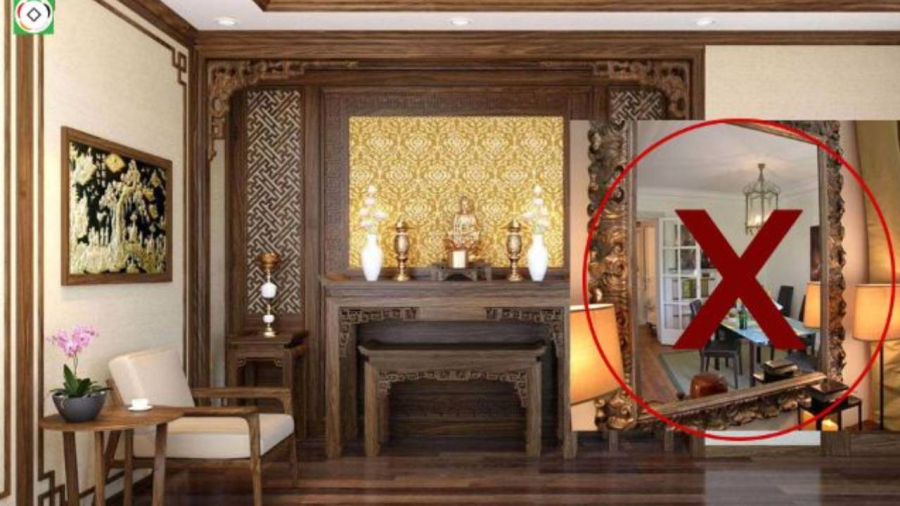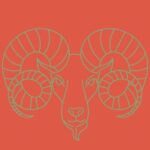Avoid placing the altar in the opposite direction of the house
It is important to know how to determine the direction of the house and the correct direction of the altar to establish its proper placement.
Placing the ancestral altar in the opposite direction of the house can cause a contrast between yin and yang, leading to possible mishaps, disloyalty from servants or children, and negative impacts on financial and familial luck, or even the absence of descendants.
According to Feng Shui, the placement of the altar should be “sitting in a favorable position and facing a favorable direction” in relation to the homeowner’s age.
Therefore, the direction of the altar should be based on the homeowner’s life path: if the homeowner’s life path is East-Four-Symbol, the altar should face one of the directions of Kan, Sun, Zhen, or Li. If the life path is West, the altar must face Dui, Qian, Gen, or Kun.

Additionally, keep the following in mind:
– Avoid placing the altar facing the direction of the Five Ghosts: Northeast and Southwest. – Do not place the altar in the Southwest direction facing Northeast. – Avoid placing the altar in the Northeast direction facing Southwest.
The altar for deities should be placed in the main direction or turned to the left or right. The ancestral altar is best placed on the first floor, in the middle room, facing the main door so that when the door is opened, the ancestors are visible and can be conveniently cared for.
Avoid placing the altar in a direct line with the entrance
According to Feng Shui for altars, if the altar is placed in direct alignment with the entrance, it will cause a loss of positive energy, leading to bad luck for the homeowner. If the house has a modest size and the altar faces the entrance directly or is placed where it can be easily seen, it is necessary to install curtains to cover the front and sides.
Avoid placing the altar near bathrooms or toilets
Everyone knows that the altar is a sacred place, so another important taboo is to not place it near bathrooms or toilets. These areas are used for eliminating waste, and placing the altar here would compromise its sanctity.
The altar should also not be positioned below a beam, and if a better location is not available, a ceiling must be constructed. Additionally, there should be no machinery above the altar, such as air conditioners, range hoods, or speakers.
Avoid an overly exposed altar
The worship space should maintain a sense of solemnity and dignity. Therefore, it is absolutely imperative to ensure that outsiders cannot see the altar, tablets, and ancestral photos as soon as they enter the house. If the house has multiple floors, the altar should be placed on the top floor. The space above the altar should be open to the sky, with no other rooms overhead. The area in front of the altar should be formal, while the back can be a staircase or spaces like a balcony or storage room.
If the altar must be placed on a lower or middle floor, avoid having a stove directly below it; bathrooms, bedrooms, or heavy objects above it; and if the altar shares a space with the living room in an apartment, a partition or folding screen should separate the worship area from the living space. This prevents direct lines of sight into the worship area.
The front of the altar slopes downward
From a spiritual perspective, if the altar slopes forward, regardless of the degree, it will impact your family’s financial situation. Therefore, in addition to being more cautious with your spending, you should also pay attention to spiritual factors and identify the cause of the altar’s unevenness, which could be due to initial design flaws, termite damage, or the type of wood used. If possible, choose a well-balanced and aesthetically pleasing altar that also ensures flatness and stability.
The incense burner or incense bowl burns spontaneously
Even without any external influence, if the incense burner, incense bowl, or incense sticks placed next to the altar spontaneously combust, it serves as a reminder to be extremely cautious in both spiritual and practical matters for the safety of your family.
From a spiritual perspective, there are two cases of omen to consider:
Incense bowl burning at the top with large flames (Yang transformation): This is considered a very good omen, indicating that you and your family will encounter happiness and that your financial situation will improve.
Incense bowl burning at the bottom with small flames (Yin transformation): This is a bad omen, suggesting that your ancestors’ graves may have been disturbed. It could also indicate that the homeowner will face challenges in their business, finances, or security.
Science has offered an explanation for this phenomenon, suggesting that when an incense stick is about to burn out, the small flame may still be sufficient to ignite the other incense sticks in the bowl. However, this is unlikely to occur without any source of fire on the altar.
Ancestral photos suddenly become tilted or “sweaty”
If the photos of your ancestors or deceased loved ones become tilted or “sweaty” due to humid weather, they should be adjusted as soon as possible. Do not ignore this phenomenon, as it can affect the Feng Shui of the altar. It indicates an excess of the Water element in the house, suggesting potential accidents and the need for caution.
Additionally, humid weather can lead to health issues, so it is essential to find ways to keep all objects in the house dry and clean.
Offerings develop mold
If offerings develop mold or emit a foul odor, even in dry, warm, or hot weather, it is a sign that your family should pay attention to. According to ancient beliefs, this could indicate a lack of sincerity in the offerings or their poor quality. Therefore, remember that offerings for worship need not be extravagant but should always be prepared with care and sincerity.
This information is for reference and contemplation only





































